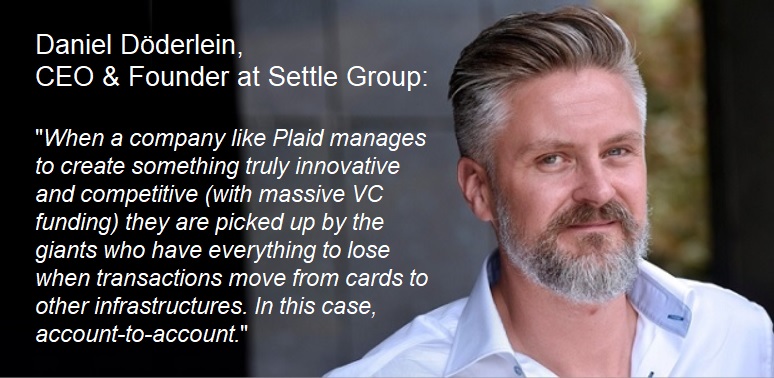
Most cards today are backed by an account. The cards are basically a proxy, the primary channel between payers and recipients. People “spend with their card” but they pay with the money in their account. When open banking (PSD2 in Europe) opens up the account, those same people can spend the money they have in their account directly, jumping past the cards. This is obviously a massive revenue and transactional flow killer for the card networks. As the account-to-account transaction route grows stronger and more relevant, the card networks buy all the components of the infrastructure as they can.
an article written by Daniel Döderlein, CEO and founder at Settle Group
The US justice department has sued Visa over its $5.3USD acquisition of Plaid, citing that Visa is seeking to eliminate competition, robbing millions of customers of significant savings and innovative online payment options to cards.
At the beginning of the year, when Visa had just announced its monumental purchase, I wrote that the battle for tomorrow’s payment infrastructure was just heating up. The TL;DR version: the intention of PSD2 was to open up innovation and create a more level playing field. But the payments giants are instead just scrambling to acquire the biggest and best of their challengers. They’re doing so in order to protect their own valuable payment rails and prevent the very outcome that PSD2 intended.
The intention of PSD2 was great but much like PSD1, it was too weak. We now see a forest of different APIs, authentication methods and an intentionally (bank-driven) massive fragmentation. This has unfortunately led to virtually no actual aggregation or payment initiation across the accounts by third parties.
The few who have the ability (i.e. resources) to do the fragmented API integrations and keep them running are the big payments giants. These same companies mostly have no incentive to challenge their existing rails. The other giants include the extremely well-funded tech companies or the big tech and media giants, like Google, Apple and Facebook, who are well on their way into payments and banking. Plaid is one such example, a competent tech company with massive funding.
In the US, where they’re not really subject to a PSD2 type of legislation yet, the position and outcome is the same. Only a few have the ability to connect to all the various APIs.
When a company like Plaid manages to create something truly innovative and competitive (with massive VC funding) they are picked up by the giants who have everything to lose when transactions move from cards to other infrastructures. In this case, account-to-account.
Realtime account-to-account payment systems from Nets were picked up by MasterCard. Vocalink was picked up by MasterCard, too. The beginning of 2020 saw the same kind of deal for Plaid and Visa but it still may not be allowed to proceed.
PSD2 in spirit is amazing and can drive competition, had it worked as intended. But the reality is that the actual access is hard to set up and it’s fragmented. This creates a massive challenge for the integrators, limiting the opportunity to a few, and those who succeed get bought by the giants.
There are also the fragmented authentication solutions by each bank, making PSD2 access less attractive from a consumer perspective compared to how one authenticates their card, the same process that’s been in place for years. This leaves the old established networks unchallenged.
In Europe, PSD3 needs to simplify and instruct all banks to connect their APIs to a national, or preferably EU based hub, where the accounts can be accessed via a standardised API with equal access for all third parties regardless of their funding or staff. This way the services offered are the competitive difference between the players, not their bag of money.
About the author
With more than 20 years of entrepreneurial experience, top 200 European fintech influencer Daniel Döderlein is the CEO and founder of award-winning mobile payments company, Settle. Sitting on the Google cloud advisory board, Daniel was the first to develop mobile payments technology in Scandinavia, the first to launch a mobile payment service in Norway (mCASH) and the first to create and run a regulated financial services platform on the public cloud. After Norway’s second largest bank, Sparebank 1, acquired mCash for exclusive use in Norway, Daniel started Settle – mobile payments for Europe.
Banking 4.0 – „how was the experience for you”
„To be honest I think that Sinaia, your conference, is much better then Davos.”
Many more interesting quotes in the video below: